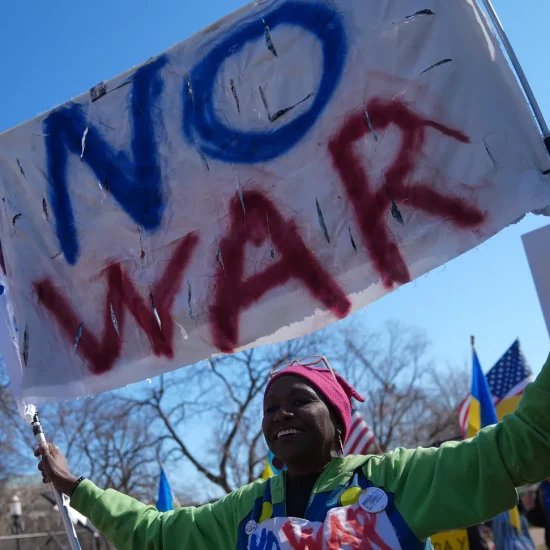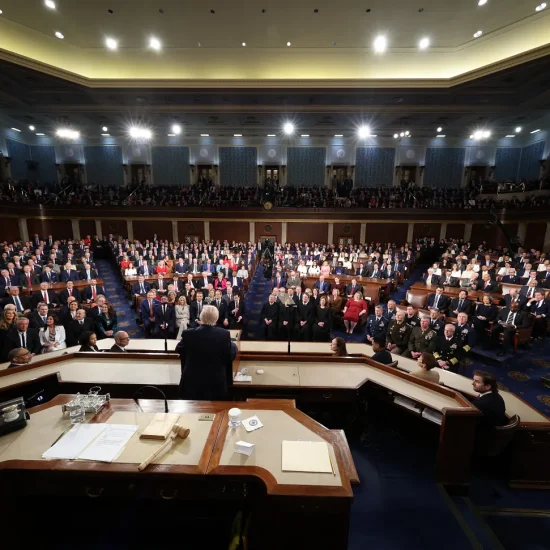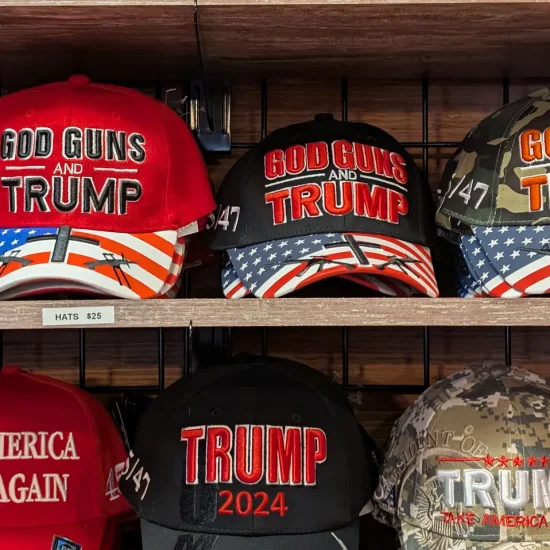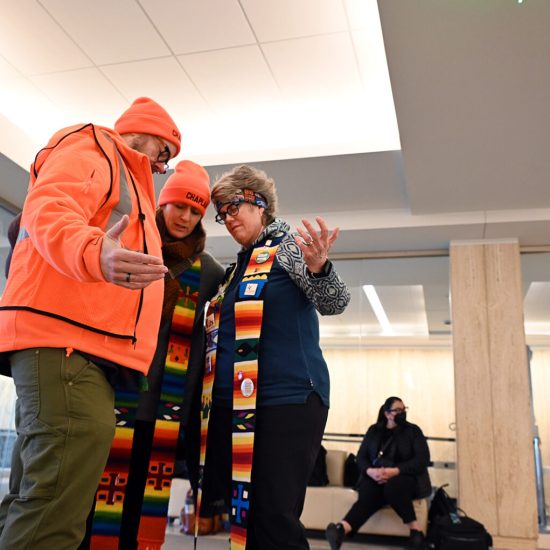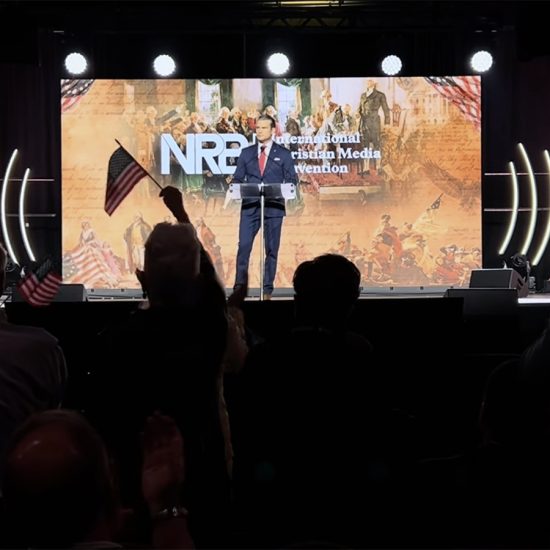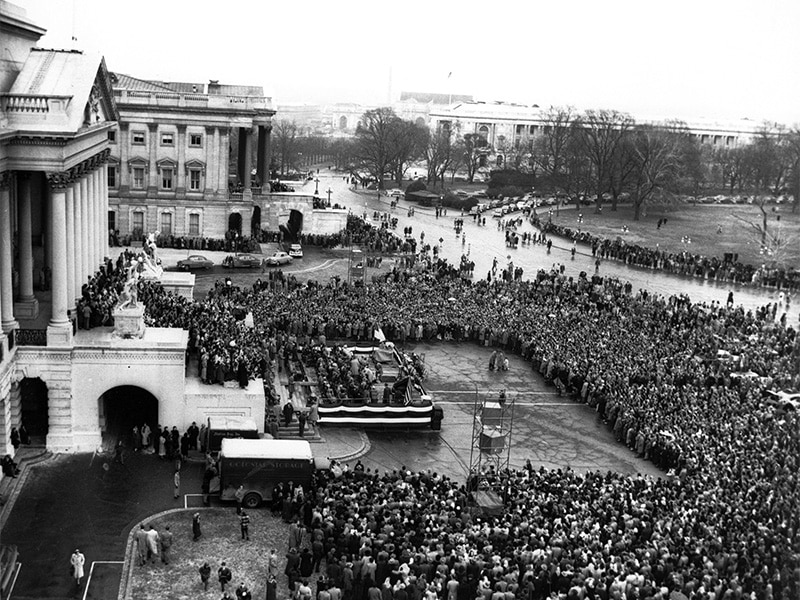
Word&Way is launching a subscription email newsletter called “A Public Witness.” Each week, you’ll receive historical background, commentary, and analysis on an important topic at the intersection of faith, politics, and culture. For just $5 a month (or $50 for the whole year), you can have expert, entertaining insights delivered straight to your inbox. Instead of just telling you about it, we wanted to offer an example. So enjoy the inaugural edition below and then subscribe to ensure you won’t miss what’s coming next week (and the week after and the week after).
__________
Did you know that the President of the United States is required to pray?
Given the First Amendment’s prohibition on laws establishing religion, this news may come as a surprise. Yet, if you look up 36 U.S.C. § 119 of the U.S. code, you will find that the law dictates that the President must “issue each year a proclamation designating the first Thursday in May as a National Day of Prayer (NDP) on which the people of the United States may turn to God in prayer and meditation at churches, in groups, and as individuals.”
Some will quibble over our characterization of this law as requiring the President to pray when the official obligation is to sign a proclamation encouraging others to pray. Others will point out that the phrase “may turn to God” is a nice escape hatch for both the one governing and those who are governed. Nobody has to obey the edict. The decision on turning to God is up to the individual’s (and the President’s) conscience. However, in practice the presidential proclamations actively encourage prayer.
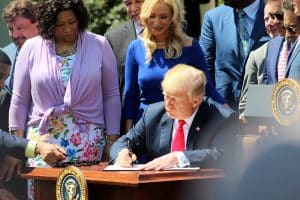
Donald Trump signs the White House Faith and Opportunity Initiative executive order during a National Day of Prayer event in the Rose Garden of the White House on May 3, 2018 (Adelle M. Banks/Religion News Service)
Consider Donald Trump’s proclamation from last year: “I encourage all Americans to observe this day, reflecting on the blessings our Nation has received and the importance of prayer, with appropriate programs, ceremonies, and activities in their houses of worship, communities, and places of work, schools, and homes.”
Or, if you’d prefer, Barack Obama’s first NDP declaration in 2009: “I call upon Americans to pray in thanksgiving for our freedoms and blessings and to ask for God’s continued guidance, grace, and protection for this land that we love.”
Almost like a preacher at the start of a church service, presidents ask us to bow our heads and join them in going before the Lord.
How Did We Get Here?
As the 1950s started, the U.S. faced significant threats from the Soviet Union.
“Americans learned that the Soviet Union now had nuclear weapons,” historian Kevin Kruse explained in his book One Nation Under God about the national feeling as 1949 wound to an end. “The paranoia over the dangers posed by ‘godless communism’ increased dramatically in the coming months and years, and so too would the campaign to Christianize America.”
Thus, Kruse explained that during the 1950s “Americans underwent an incredible transformation in how they understood the role of religion in public life.”
A nuclear threat. A war in Korea. Many Americans wanted assurances that God was on our side.
The next few years would see several efforts to baptize the nation caught in a “cold war.” Congress added “under God” to the Pledge of Allegiance in 1954. And President Dwight D. Eisenhower signed a law making “In God We Trust” the national motto in 1956.
In this context, evangelist Billy Graham staged a large rally at the U.S. Capitol in January 1952. Senator Willis Robertson of Virginia – and father of televangelist Pat Robertson – gained unanimous Senate support for Graham’s “crusade” in Washington, D.C.
Preaching at the Capitol, Graham exclaimed “What a thrilling, glorious thing it would be to see the leaders of our country today kneeling before Almighty God in prayer.” Shortly after the rally, Congress took up the idea of mandating an annual National Day of Prayer. The legislation required presidents to name such a day – as long as it wasn’t a Sunday.
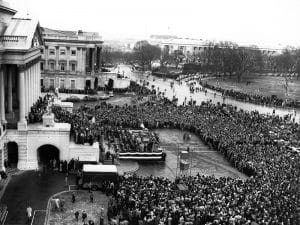
Billy Graham’s service from the steps of the U.S. Capitol on Feb. 3, 1952. (Billy Graham Evangelistic Association/Religion News Service)
President Harry Truman, the first president required by Congress to call for a day of prayer, chose the 4th of July in 1952. Truman clearly linked this effort with a patriotic devotion in asking for the “protection of Divine Providence” for the nation. (Truman spent the day at a doubleheader between the Washington Senators and the New York Yankees, and if he prayed for his home team it didn’t work as the Yankees won them both.)
In 1988, Congress changed the law to mandate the NDP as the first Thursday in May, rather than a non-Sunday of the president’s choosing. Thus, you are receiving this email on the official – as mandated by the legislative branch and proclaimed by the executive branch – 2021 National Day of Prayer.
The NDP also eventually received blessing from the other branch of our federal government. After a group of atheists sued in 2008, a federal judge ruled in 2010 that the establishment of the NDP did, in fact, violate the constitutional prohibition on establishing religion. However, a federal appeals court the next year declared the plaintiffs lacked standing and so overturned the ruling and allowed the practice to continue.
All of this could seem innocuous. What could be offensive about the government setting aside a day for prayer? Yet, as is so often in life, things are not always what they seem. What looks like an innocent moment of common devotion is far more problematic than most Christians (and most Americans) realize.
Get cutting edge analysis and commentary like this in your inbox every week by subscribing today!
Bad for Democracy & Prayer
There are multiple issues with the National Day of Prayer warranting consideration. Here are three that are particularly troubling.
First, the National Day of Prayer feeds an ideology of Christian Nationalism that depicts the U.S. as God’s divinely-chosen nation. The formation of the NDP in the context of a military struggle against those “godless Communists” in the Soviet Union raises questions about the motivations that animated the original event.
From the beginning, this exercise treats God as a good luck charm blessing our endeavors and invites God to put a divine thumb on the scale in our favor. That triumphalist impulse has remained.
“Our Armed Forces have achieved great success on the battlefield, but challenges still lie ahead. Prayer will not make our path easy, yet prayer can give us strength and hope for the journey,” George W. Bush declared in his 2003 NPD proclamation. “As we continue to fight against terror, we ask the Almighty to protect all those who battle for freedom throughout the world and our brave men and women in uniform, and we ask him to shield innocents from harm.”
Rather than bringing us to the introspection of the Old Testament prophets who called on their own nation to deal with their own sins, the NDP instead conjures up a divine blessing with the belief that God must be on our side. Perhaps that newer Jewish prophet, Bob Dylan, warned us best about the delusions of such righteous partisanship.
“I’ve learned to hate the Russians all through my whole life. If another war comes it’s them we must fight,” Dylan sang in “With God on Our Side” in 1963. “And you never ask questions when God’s on your side.”
But then the prophet, who spends the song going through many wars where we said God was on our side, turns the world’s vision upside down: “If God’s on our side, he’ll stop the next war.”
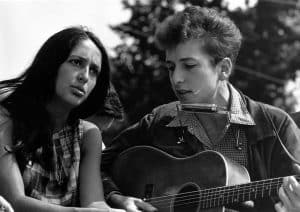
Bob Dylan with Joan Baez during the 1963 March on Washington. (Rowland Scherman/Public Domain)
Second, the National Day of Prayer implies that to be a good American, one must also pray to a particular God in a specific way. Presidents often cast this day as one to bring unity across the nation, even though many Americans are either atheists or follow a religious tradition that doesn’t worship a monotheistic god.
Barack Obama in 2009 called it “this day of unity and prayer.” And Joe Biden this year said that “on this National Day of Prayer, we unite with purpose and resolve.” But how does prayer to a being someone doesn’t worship create national unity for them? It doesn’t. The NDP – and presidential proclamations – tell such Americans they aren’t fully part of the nation’s body politic. And that’s dangerous for any democracy.
When presidents talk about the NDP and “we the people,” they inherently leave many out. As Donald Trump talked in his 2020 NDP proclamation about the impact of coronavirus, his use of “we” to talk about the American people didn’t include all Americans.
“Even though we have been unable to gather together in fellowship with our church families, we are still connected through prayer and the calming reassurance that God will lead us through life’s many valleys,” Trump wrote. “In the midst of these trying and unprecedented times, we are reminded that just as those before us turned to God in their darkest hours, so must we seek his wisdom, strength, and healing hand.”
If America is to live up to its founding creed of religious liberty for all then we cannot pretend that monotheistic prayer is unifying or an act our government should promote. Although the federal courts have not ruled the NDP unconstitutional, it doesn’t mean the event is religiously neutral. Every person who feels alienated from their country because they don’t fit within the “we” that is assumed by these proclamations is a crack in the long cherished wall between church and state.
“The government shouldn’t be in the business of telling the American people what, where, or when to pray or even if they should pray,” Holly Hollman, general counsel of the BJC, said back as courts considered the issue. “The problem with the National Day of Prayer is that it is an official act of the government urging citizens to engage in a religious exercise.”
Third, the National Day of Prayer celebrates a generic “god” devoid of identity and substance. Who is this “god” presidents ask us to pray to each year? The idea that God can be reduced to a unifying mascot everyone in the nation can root for should be offensive to devoted believers.
Even when presidents give lip service to the pluralistic nature of our nation, they often do so in ways that undermine that message: “On this National Day of Prayer, let each of us, according to our own faiths, call upon God for his guidance and express our gratitude for the love and grace he bestows on us and our country,” Donald Trump said in his 2019 NDP proclamation that told people regardless of their faith to worship God.
As Christians who proclaim the Lordship of Jesus, we reject efforts to water down God into an undemanding, one-size-fits-all deity. We believe in and cherish interfaith dialogue and cooperation. But that doesn’t mean we worship an interfaith “god.”
While civil religion efforts like the NDP create problems for democracy, they are even worse for faith – because they diminish our sacred practices. As Rev. Greg Boyd reminded us in his book The Myth of a Christian Nation, problems arise when we “forget that the kingdom of God always looks like Jesus and has no intrinsic relationship with any civil religion,” including “the quasi-Christian civil religion” of the United States.
“Couldn’t one even go so far as to argue that it would be good for the kingdom of God if this civic brand of pseudo-Christianity died altogether?” Boyd added. “Isn’t one of the primary problems we’re up against in this nation the fact that Christianity has been trivialized by being associated with civic functions?”
Arguably, the National Day of Prayer is the example of this, par excellence.
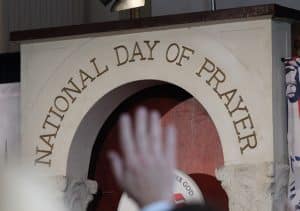
A National Day of Prayer was marked at an observance in the Cannon House Office Building in Washington, D.C., on May 2, 2013. (Adelle M. Banks/Religion News Service)
Don’t miss next week’s “A Public Witness.” Sign up now for this weekly email!
Praying for a Better Way
Two Christian leaders critiquing the National Day of Prayer may seem unexpected, perhaps even jarring. But we do not issue our critique merely for the sake of sparking controversy – and especially not as an effort to provoke critical responses from folks who struggle to hear our argument.
Our goal is to get Christians to take prayer seriously. We criticize the NDP because of the high value we place on prayer as a spiritual discipline that is foundational to our lives as followers of Jesus. For whatever good you might believe a presidential proclamation about prayer serves, it simply is not – and cannot be – the type of rich prayer experience that Christ demands from his followers.
In Matthew’s Gospel, Jesus levels a harsh critique against those who make a big public display of their prayers. He chastises those who use feign devotion by using words that sound pious but lack substantive meaning (6:5-8). You start taking his teachings seriously and start to think, “maybe Jesus wouldn’t be a big fan of the National Day of Prayer, either.”
Jesus follows these words of judgment with a corrective example: “This, then, is how you should pray,” he says and goes on to teach his disciples what we have come to know as “The Lord’s Prayer” (6:9-13). That prayer stands in sharp contrast to the utterances heard on the NDP.
Our Father is a claim about a specific God and that God’s relationship to Jesus and to us, not a generic reference to an undefined deity. Your kingdom come is a plea that heaven’s ways would come down to earth, while the NDP is too often about pretending that our country is a mirror reflecting heaven and that the God of all favors this particular nation above others. Forgive us our debts, as we have forgiven our debtors are words that challenge the ungraciousness of our culture, the economic practices we depend upon, and the mass incarceration system that is more about racism and retribution than placing our hope in the power of redemption.
The prayer life Jesus encourages us to practice challenges our triumphalism by requiring a humble posture and an acknowledgement of our dependence upon the God who is not the partisan of one nation but sovereign over all the nations. Prayer was a powerful tool not for uniting the Roman Empire but for fostering togetherness among Christians in the early church, who prayed as they shared communion and taught others about the life, death, and resurrection of Jesus (Acts 1:14, 2:42).
Both scripture and the Christian tradition encourage prayer for the nations, and for the particular nation in which a Christian resides, but the perspective from which these prayers are lifted up matters a lot. We do not pray as citizens to become God’s favored country. We pray as Christians for all nations and all rulers that they might participate in God’s Reign of love, justice, and peace rather than perpetuate sins of hatred, oppression, and violence. We pray as the ones who profess Jesus to be Lord that we would not make idols out of human rulers or falsely associate worldly empires with the Kingdom of God.
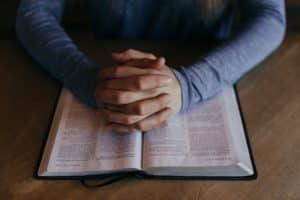
(Patrick Fore/Unsplash)
The National Day of Prayer has become (and likely always was) one of two things. It is either the exercise of a vague civil religion that prays to a very bland God or it is a thinly veiled attempt to imbue the constitutionally secular government of the United States with sectarian meaning. The former is a lowest common denominator devotion that fails to inspire. The latter is an egregious and idolatrous expression of Christian Nationalism – the same deadly ideology we witnessed during the Jan. 6 ransacking of the Capitol where Graham preached in 1952. Neither approach reflects the type of prayer life Jesus encouraged of his followers.
So, let’s stop trying to transform the government into a church. Today, as we do everyday, we will pray. Not because a human leader in Washington told us we should pray, but because of the words and witness of the One who humbled himself even to death on a cross.
We will pray for the world and its leaders on a daily basis in the hope they will use their power to let justice roll down like waters, and make righteousness an ever-flowing stream. We find the suggestion of substituting our prayers to the Living God as Christians within Christ’s Church for something far less to be intolerable. We will not babble on like pagans.
As a public witness,
Brian Kaylor & Beau Underwood

